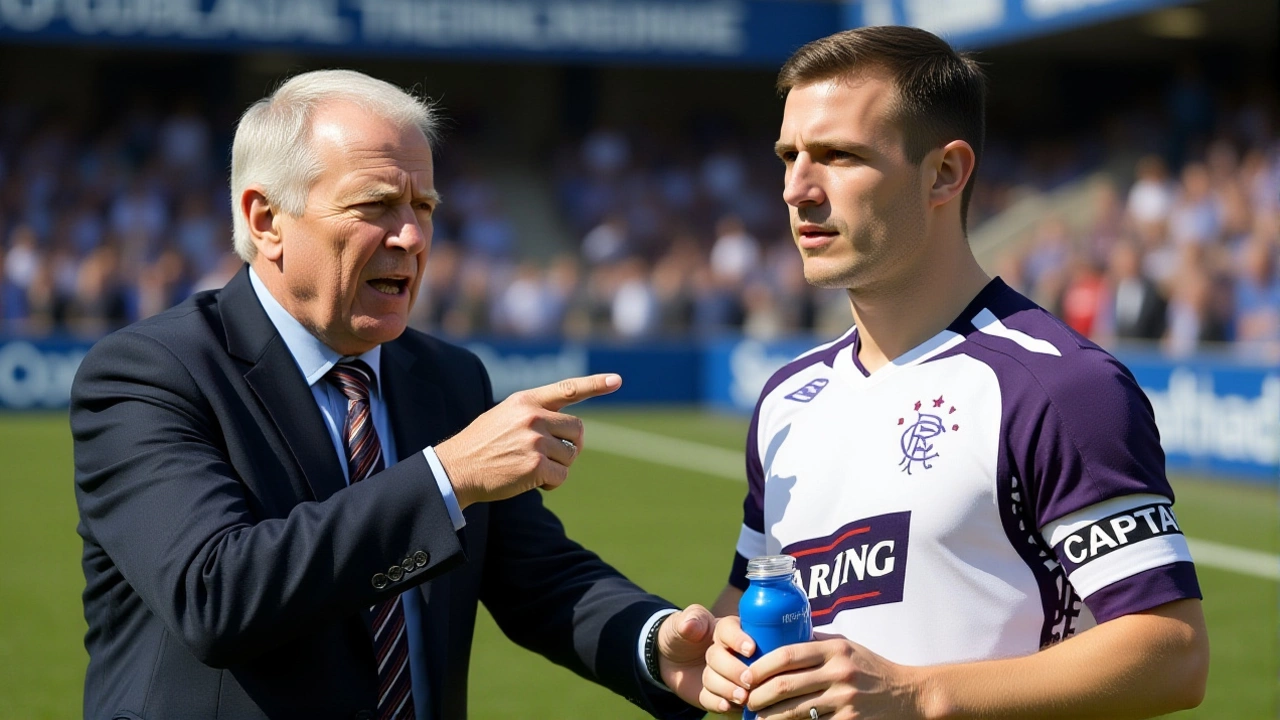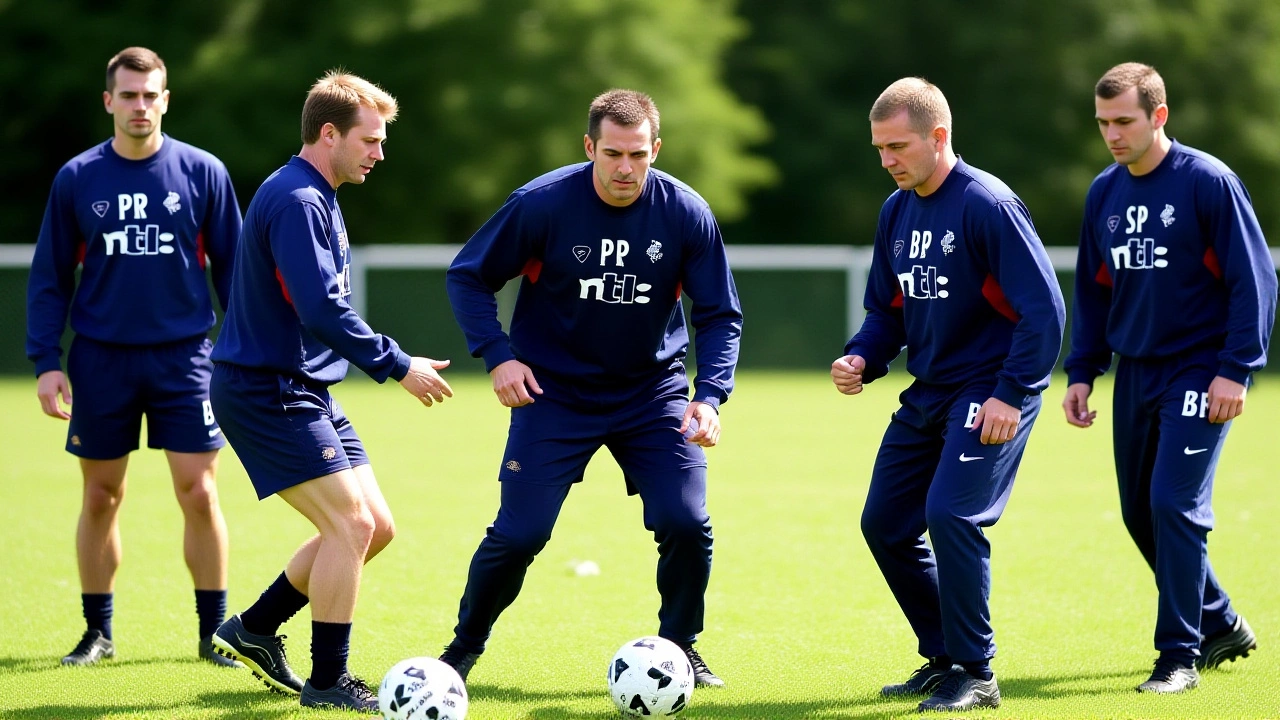When Fernando Ricksen lay in his Amsterdam home on September 5, 2019, frail from motor neuron disease but sharp as ever, he recounted a quiet but pivotal chapter of Scottish football history: how Rangers Football Club’s manager, Dick Advocaat, tasked him—then just 23—with babysitting a brilliant, wild young talent named Barry Ferguson. It wasn’t a joke. It wasn’t hazing. It was a calculated move during one of the most dominant eras in the club’s history. Ricksen, who passed away just eight days later on September 18, 2019, at age 43, didn’t just remember the arrangement—he lived it, 15 times over, in hotel rooms from Dundee to Aberdeen.
The Roommate Assignment
It started after Ferguson’s late arrival to the Champions League qualifier against FB København on July 28, 1999, at Ibrox Stadium. He was fined £28,000—two weeks’ salary at £7,000 per week. Then came the red card against Hibernian at Easter Road in March 2000. Advocaat, who’d won the league the year before and was chasing a second consecutive title, wasn’t just annoyed. He was worried. Ferguson, 21, had the vision of a playmaker and the temperament of a teenager. So Advocaat called Ricksen into his office. "Fernando, I need you to room with Barry," Advocaat reportedly said. "Keep an eye on him. He’s a fantastic player but he’s getting into trouble." Ricksen, a disciplined Dutch international who’d played for AZ Alkmaar and knew the weight of Champions League nights, didn’t protest. He understood the assignment. "I spoke Dutch with Barry so others couldn’t understand," Ricksen told the Daily Record. "I’d tell him, ‘You’re too good for this. Focus.’ He respected me because I’d been there."A System Built on Trust
The arrangement wasn’t casual. It was formal. Advocaat paid Ricksen a £500 monthly bonus—documented in his August 1999 contract addendum—for this unofficial duty. Over the 1999-2000 campaign, Ricksen shared rooms with Ferguson during away trips to Tannadice Park in Dundee, Pittodrie Stadium in Aberdeen, and beyond. There were no cameras. No logbooks. Just two young men in twin beds, talking in a language the rest of the squad didn’t understand. "It wasn’t about spying," Ricksen clarified. "It was about being there. When Barry wanted to go out, I’d say, ‘You’ve got a game on Wednesday. You know what happens if you’re not sharp.’ He listened." The results spoke for themselves. Rangers won the 1999-2000 Scottish Premier League title, their third consecutive under Advocaat. Ferguson, who’d joined the club’s youth system at 16, was named captain in October 2000. He went on to earn 45 caps for the Scotland national football team.The Human Side of Management
What makes this story resonate isn’t just the tactic—it’s the humanity behind it. Advocaat, a coach known for his tactical precision, didn’t punish Ferguson into compliance. He entrusted someone who’d been there, someone who could speak his language—literally and emotionally. Ricksen, a foreigner in Scotland, became an unlikely mentor. Ferguson, in his own words on Twitter after the story broke, called Ricksen "a brother." "Dick did that for my own good—I wasn’t perfect then," Ferguson wrote on September 11, 2019. "Grateful for their guidance." Rangers historian David Mason, author of Ibrox: The Official Biography, noted the broader context: "This was the transition from Souness’s hard-nosed, win-at-all-costs era to Advocaat’s structured, technical rebuild. Ferguson was the symbol of that change—a raw talent being shaped into a leader." The arrangement ended naturally. After Ferguson married Louise Martin on June 17, 2000, at St. John’s Church in Glasgow, Ricksen noticed a shift. "After he married, Barry settled down. No more need for room checks."
A Final Gift
Ricksen’s interview with the Daily Record came just eight days before his death. Diagnosed with MND in 2013, he’d spent years raising awareness and funds for the disease. Yet in his final weeks, he chose to speak about this quiet moment in football history—not for drama, but for truth. He didn’t want to embarrass Ferguson. He didn’t want to glorify Advocaat. He simply wanted to honor the unspoken bond that helped shape a great player. Advocaat, now 77 and managing the Netherlands national team, confirmed the bonus arrangement in a September 12, 2019, interview with De Telegraaf. "Fernando was the right person—professional, disciplined. Barry needed structure. He got it." The irony? Ferguson, who later served as Rangers’ interim manager in 2015, now leads with the same calm authority he once needed. Ricksen, who never coached, left a legacy not in trophies, but in the quiet influence of one man helping another find his way.What Happened After?
Rangers went on to win the 2000-01 title, completing a historic three-peat. Ferguson remained captain until his departure in January 2005. Ricksen stayed until 2006, winning two more Scottish Cups and a League Cup. Both men later returned to the club in different capacities. Ferguson as interim manager; Ricksen as a club ambassador during his illness. Today, Rangers’ 2022-23 valuation stands at £285.7 million. Ibrox Stadium, with its 50,987 seats, still echoes with chants from a golden era. But in the quiet corridors of memory, there’s a story that never made the headlines: two young men, sharing a room, talking in Dutch, trying to keep a star on track.Frequently Asked Questions
Why did Dick Advocaat choose Fernando Ricksen to monitor Barry Ferguson?
Advocaat chose Ricksen because he was disciplined, experienced in European football, and spoke Dutch—allowing private conversations with Ferguson that others couldn’t overhear. Ricksen had played for AZ Alkmaar and competed in the Champions League, giving him credibility with the younger Ferguson. Advocaat later confirmed he paid Ricksen a £500 monthly bonus for this role, documented in his contract.
How did Barry Ferguson respond to being monitored?
Ferguson didn’t resent the arrangement. In fact, he later called Ricksen "a brother" and credited Advocaat’s intervention for helping him mature. After marrying Louise Martin in June 2000, Ferguson’s behavior stabilized, and he became captain within months. His 2019 Twitter response showed deep gratitude, not resentment.
Was this kind of monitoring common in football at the time?
Not officially, but informal mentoring was common, especially in clubs transitioning between eras. Rangers were shifting from Graeme Souness’s tough-love model to Advocaat’s technical, structured approach. Ricksen’s role was unique because it was documented with a bonus and tied to specific incidents, making it a rare publicly confirmed case of structured behavioral oversight.
What impact did this have on Rangers’ success during 1999-2000?
Ferguson played 43 of 46 league games that season, scoring 7 goals and providing 11 assists. His development into a reliable captain was central to Rangers winning the title. Without Ricksen’s influence, Ferguson might have continued his erratic behavior, risking suspensions and team cohesion. Advocaat’s gamble paid off: three straight league titles followed.
Why is this story significant now, years later?
It’s significant because Ricksen shared it in his final days, turning a behind-the-scenes management tactic into a tribute to mentorship and quiet leadership. It humanizes football’s high-stakes world, showing that even at the top level, success often hinges on personal connections—not just tactics or transfers. Ricksen’s integrity in telling the truth, without sensationalism, makes it a lasting legacy.
Did Fernando Ricksen ever speak about this publicly before his death?
No. This was Ricksen’s first and only public account of the arrangement. He’d been focused on MND advocacy since his 2013 diagnosis. The Daily Record interview, conducted just days before his death, was his final major statement on football—and it was about helping someone else, not himself.
